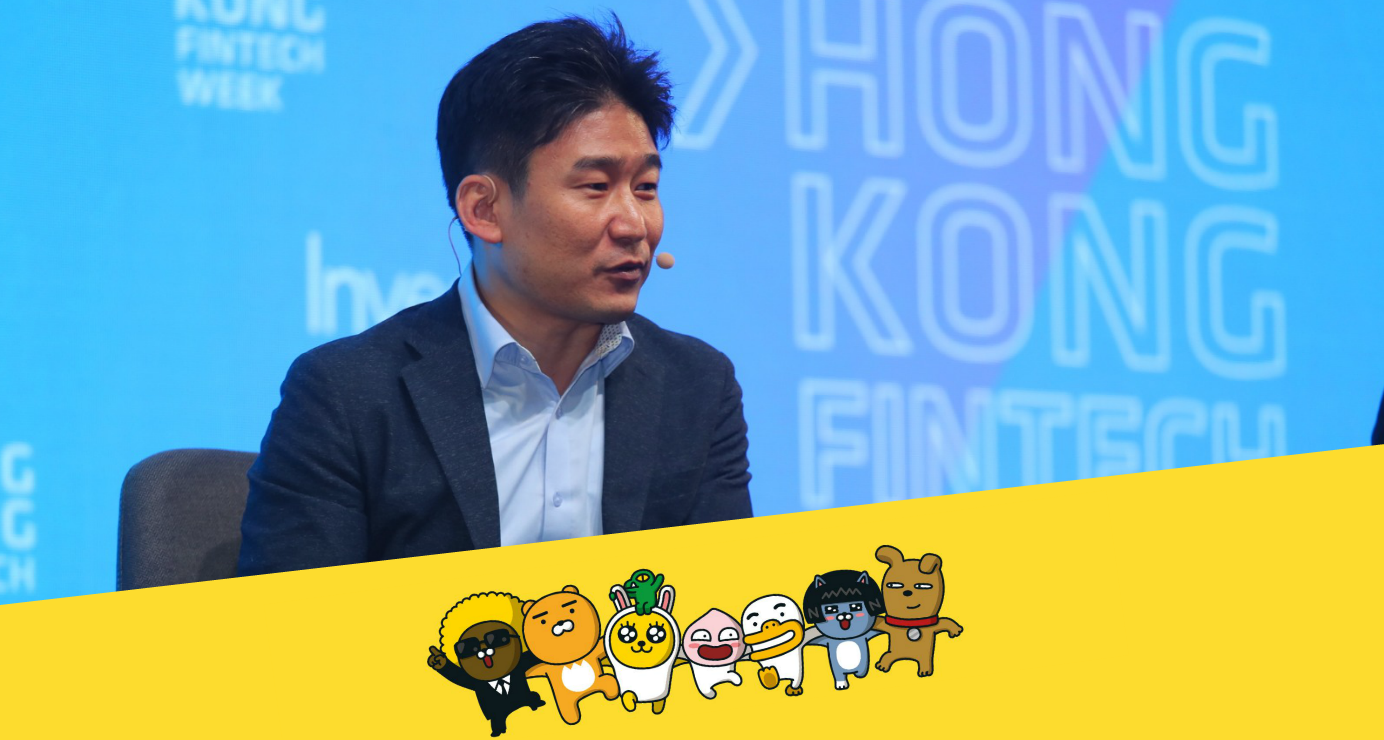 Date 29 November 2019 Jason Han, CEO of Ground X.The Kakao subsidiary is working on blockchain applications with KakaoTalk, Korea’s dominating messaging app famous with its Kakao Friends characters.Photos: Kakao, Ground X Ben Ng – Nov 29, 2019 4:51pm How a Korean internet firm is building a blockchain ‘killer-app’
Date 29 November 2019 Jason Han, CEO of Ground X.The Kakao subsidiary is working on blockchain applications with KakaoTalk, Korea’s dominating messaging app famous with its Kakao Friends characters.Photos: Kakao, Ground X Ben Ng – Nov 29, 2019 4:51pm How a Korean internet firm is building a blockchain ‘killer-app’
Among the tech firms around the world that have hopped onto distributed ledger technology (DLT), which is more commonly known as blockchain, is South Korean internet firm Kakao.The company, which operates the KakaoTalk messaging app and is also involved in businesses such as gaming, mobile banking, taxi services, music and advertising, has embraced blockchain through a unit named Ground X.
Jason Han, CEO of Ground X, recently sat down with EJ Insight to discuss how Kakao is pushing its blockchain experiment and extending it into segments such as gaming, digital identification, and financial services.
Ground X aims to build a platform in Asia powered by blockchain, the technology that underpins cryptocurrencies like bitcoin, by collaborating with companies with large user bases.The goal is to develop a “killer app” and make blockchain more accessible to regular and individual users.
“We designed our blockchain platform, Klaytn, and optimized it for large-scale consumer service and enterprise use,” Han said, pointing out that at this stage the focus is on scalability and performance, in terms of processing speed and latency.
Since its inception, blockchain has promised to make trusted third parties redundant, through a decentralized structure of the technology platform.
But for Kakao’s blockchain platform, “we give up [full] decentralization, right now, for high speed.”
It has formed the Klaytn Governance Council, which consists of 30 heavyweight corporates including LG Electronics, Korean mobile gaming giant NetMarble, SK Networks, and UnionBank, among others.
With a different role among other stakeholders in Klaytn’s ecosystem, these council members are responsible for operating consensus nodes for the blockchain platform and participate in key decision making related to the business, technology, and ecosystem growth.
Unveiled in June this year, Facebook’s cryptocurrency-based payment network, Libra, has adopted a similar setup in its governance mechanism.Its Libra Association starts with corporate partners such as Uber, Lyft, and Spotify.
Han believes the current blockchain technology cannot achieve scalability, performance and decentralization all at the same time.
“If you want to get high-speed, you cannot get full decentralization right now,” he said.
“We will need some experiments with real-use cases in this small scale, with enterprises, on the token economy and governance mechanism.”
Klaytn will achieve gradual decentralization, according to Han.Its governance council plans to expand to 50 members by the first half of next year, by introducing new members from various industries like the financial sector.
Full decentralization takes time
“I am realistic and very pragmatic.I think [full] decentralization takes time, maybe 10 years or 20 years, to achieve,” and the focus should lie in developing long-awaited real-use cases to prove the value of the blockchain technology.
“The biggest problem with blockchain right now is that there isn’t a single service that an average person would use,” Han said.“Our strategy is to embrace massively the average user first.”
Seeking capital and business alliances with consumer-service and large-sized companies, Han said the practical approach allows the applications built on Klaytn to have access to an existing large user base, which will drive mass adoption.
So what are the applications Kakao is providing through its blockchain platform?
“The first [series] of use cases will be mobile games, entertainment, e-content, and esports, rather than financial services, as in the latter we have to resolve [the challenge of] regulations.
South Korean regulators have a strict stance against cryptocurrency and blockchain, so I think [for financial application] it takes time.”
Taking the gaming applications on top of Klaytn as an example, Han said rather than uploading the whole game to the blockchain, certain functions of the components that make up the game could be separated out between centralized system and the blockchain.
“Klaytn’s blockchain games will tokenize the virtual items in the games into non-fungible tokens, NFT (a specific type of crypto-token that represents a unique asset), allowing gamers to purchase and use in the game, and trade on digital item marketplaces like OpenSea.
“There were already virtual currencies in games since twenty years ago, such as ‘Hangame coin’,” noted Han.“ Korean users are very familiar with the concept of virtual items and virtual currency,” he said, adding that he believes it would be easier for Korean gamers to be early adopters for cryptocurrency and blockchain applications.
For the next step, Han sets his sights on the blockchain-based digital personal identity (DID) system, a popular direction for blockchain development in South Korea.
Major Korean firms have partnered this year to launch a blockchain-based mobile ID system, which allows individuals to control their IDs with various personal information, such as resident registration information or bank account numbers, in the smartphones.
Han said one way Klaytn can work on the blockchain-based digital ID (DID) application would be collaborating with companies with Asian market presence, to provide a “global digital ID” for individual users.
“People can use our DID to open financial and banking accounts without providing other physical ID certificates, which for now, involves a time-consuming, complicated process,” said Han.
The blockchain-based digital ID application, which enables individuals to control their identity, qualifications and personal information, can finally lay an important foundation for the development of blockchain-based applications in the financial service space, according to Han.
“DeFi is very popular right now in the crypto space, but currently it doesn’t have any legal and regulatory compliance framework on aspects such as KYC.If we can integrate DID with DeFi, DeFi can go mainstream.”
DeFi, or Decentralized Finance, is a recent trend in the blockchain space.
DeFi projects are traditional financial products that you would expect from a traditional bank being built on top of a blockchain, such as connecting borrowers and lenders directly.
Han said Ground X plans to integrate the Klaytn crypto wallet in the KakaoTalk messenger app, which accounts for 96 percent of the Korean market in its segment.
“It means every Korean will get a crypto wallet without any separate installation, automatically, as our first step in attracting mainstream users.”
Attracting mainstream users
The crypto wallet will be used to store various digital assets, such as the NFT from blockchain games, and the tokenized DID, and “people can easily store and transfer digital assets with their friends, even if they don’t know much about how the blockchain technology behind works.”
One point worth mentioning is that while the market has been excited about the payment use case of cryptocurrency, it is not an attractive entry point for Klaytn’s blockchain applications, according to Han.
“Mobile payment services are very popular and convenient in Korea, every Korean uses KakaoPay or Toss.If we can easily send money to our friends in just one click, why do we have to use cryptocurrency for mobile payment?”
“KakaoPay is very convenient, just like WeChat Pay in China.Normal users don’t need another payment service right now… What can we give them as an additional benefit for using crypto in payment? I don’t know, maybe cross-border payment? But I don’t know about that because that would involve regulations,” said Han.
Kakao is not alone in the social network space jumping into the blockchain industry.Facebook unveiled its Libra cryptocurrency network in June.Telegram, which has an estimated 300 million users worldwide, has been preparing to launch its TON blockchain project.
Kakao’s longstanding rival Naver, which owns Japan’s largest messaging app, LINE, has also launched its cryptocurrency initiative with its subsidiary, LINE Plus.
In the interview with EJ Insight, Han said Kakao’s governance structure of the consortium blockchain is similar to Facebook’s Libra, except it is way ahead in its development.Since its launch in late June, Klaytn has been running well without any errors halting its operation.
“Facebook’s Libra focuses on stablecoins (the digital token designed to be pegged to real-world assets with set prices – such as fiat currencies – to help combat price volatility), it is very difficult in terms of regulations.
You don’t want to go there,” said Han.“We want to start from the technology platform and working with industries, providing real use cases first, and then, we can expand to financial sectors, but we don’t know how long it will take.”
“And as for Telegram [TON blockchain network], it is just one mobile messenger service, but Kakao has built a lot of services already, such as gaming, mobile banking, mobility services, and payments, and we have 30 enterprises to develop more and more applications on top of Klaytn.”
“Telegram can’t do that because of their philosophy and principle,” said Han.“Telegram is kind of ‘anarchist’, they don’t like enterprises and centralized things, they cannot do collaboration with big enterprises… On the other hand, big enterprises don’t believe in Telegram, but they believe in Kakao, a public, regulated company.So [Telegram’s TON and Kakao’s Klaytn] are in different positions.”
In the interview, Han revealed that Facebook had approached Klaytn before it unveiled the Libra cryptocurrency initiative.
“Actually before announcing Libra, Facebook contacted us, and we talked to them,” he said.Asked about why Klaytn didn’t join the Libra Association, Han said: “We would have needed a lot of money if we applied to join the association.US$10 million for deposit, well, I don’t know.”
But he said the two firms can collaborate in technology, as the two blockchain platforms are in similar governance mechanism approach, and Klaytn has been stable and already up and running.
“We can give our lessons to Facebook’s Libra.”
RC.
